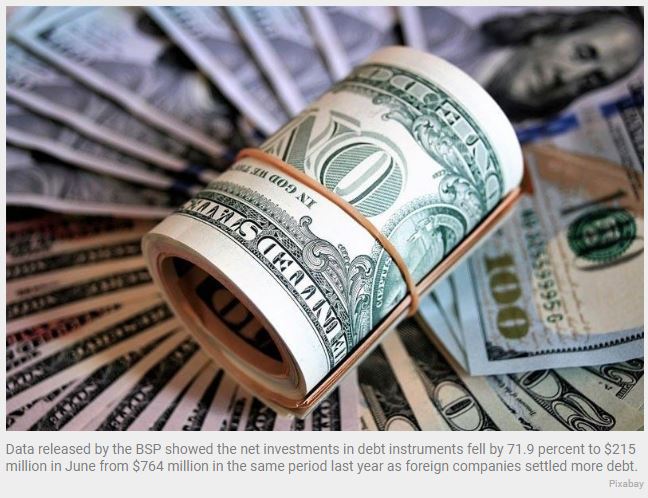Philippines: FDI inflow plunges 52% in June
Lowest in 13 months
MANILA, Philippines — The net inflow of foreign direct investments (FDIs) plunged by 51.5 percent to a 13-month low of $471 million in June from $971 million in the same month last year due to higher repayments by multinational companies, according to the Bangko Sentral ng Pilipinas (BSP).
Data released by the BSP showed the net investments in debt instruments fell by 71.9 percent to $215 million in June from $764 million in the same period last year as foreign companies settled more debt.
“In June, FDI net inflows declined following the drop in non-residents’ net investments in debt instruments of their local affiliates due to higher repayments during the month. This muted the increase in their net investments in equity capital and reinvestment of earnings,” the BSP said.
Equity capital placements from Japan, the United States, Singapore and Switzerland channeled mainly to manufacturing, real estate as well as information and communication went up by 20.8 percent to $143 million in June from $119 million a year ago.
On the other hand, withdrawals plunged by 54.8 percent to $12 million in June from $26 million in the same month last year.
The central bank data also showed that reinvestment of earnings rose by 8.6 percent to $124 million from $115 million.
Michael Ricafort, chief economist at Rizal Commercial Banking Corp., said the net FDI inflow in June was the lowest since the $455 million recorded in May last year.
Ricafort attributed the decline to the increase in global and local market volatility in June as markets posted the immediate lows after inflation in the US soared to a new 40-year high, prompting the US Federal Reserve to deliver huge rate hikes.
Ricafort also said the higher inflation and interest rates in the Philippines as well as investors’ wait-and-see stance served as a drag to new investments.
He enumerated other risk factors, such as the adverse business effects of the Russia-Ukraine war that led to still relatively higher global commodity prices and inflation, more aggressive Fed rate hikes, higher global interest rates, risk of recession in the US and continuation of some lockdowns in China.
From January to June, the net FDI inflow inched up by 3.1 percent to $4.64 billion from $4.5 billion in the same period last year.
The net investments in debt instruments, the BSP said, went up by 12.3 percent to $3.34 billion from $2.98 billion. This erased the 24-percent plunge in net capital infusion to $739 million from $978 million.
Equity placements fell by 28.6 percent to $823 million from January to June compared to $1.15 billion in the same period last year, while withdrawals plunged by 51.9 percent to $84 million from $174 million.
Data also showed the reinvestment of earnings inched up by 1.9 to $599 million from $549 million.
“Said cumulative growth was due to the expansion in non-residents’ net investments in debt instruments, which more than offset the decrease in their net placements of equity capital other than reinvestment of earnings,” the BSP said.
Ricafort said net FDI eased from among pre-pandemic highs in previous months, but could still pick up in the coming months as the new administration continues to lift strict COVID quarantine and lockdown protocols.
The BSP sees the FDI inflow inching up by 4.8 percent to a record high of $11 billion this year from $10.5 billion last year. The level is seen rising further to a new all-time high of $12 billion in 2023.
Source: https://www.philstar.com/business/2022/09/13/2209243/fdi-inflow-plunges-52-june


 English
English




